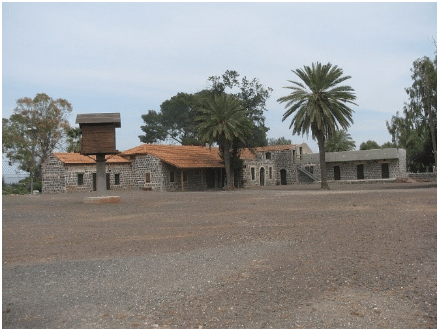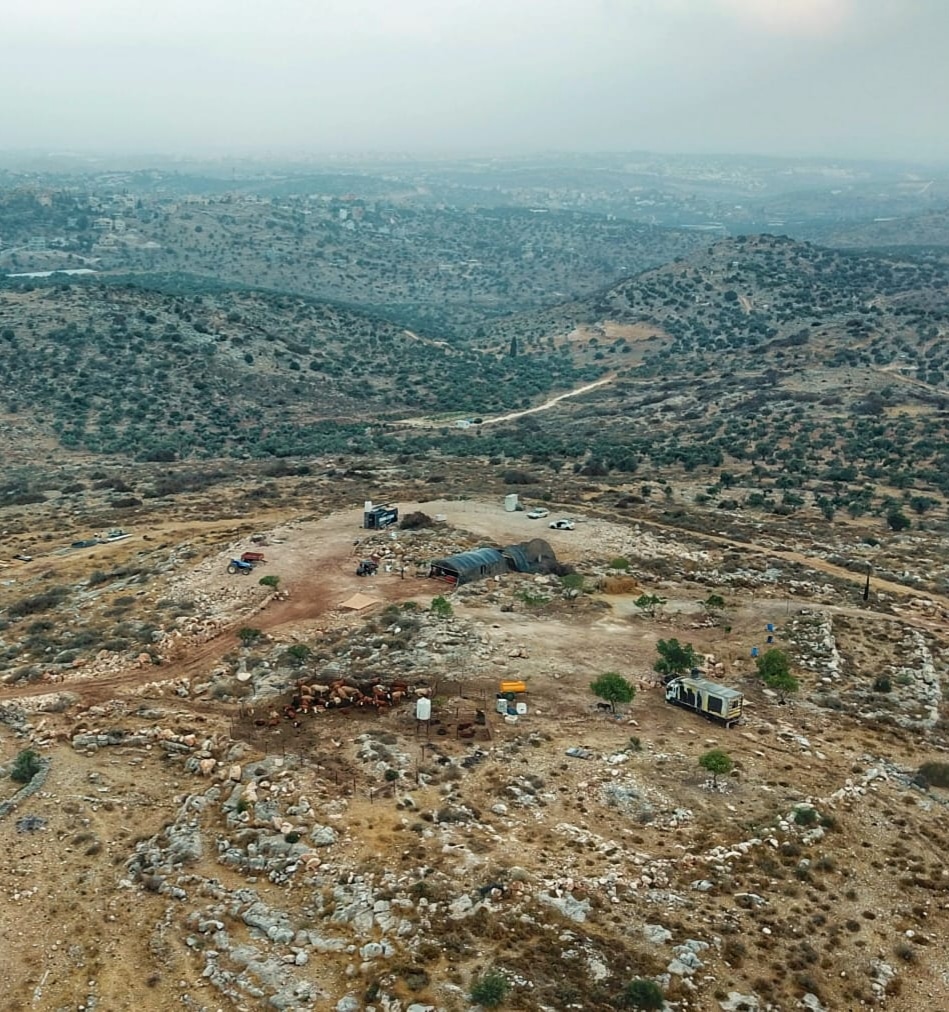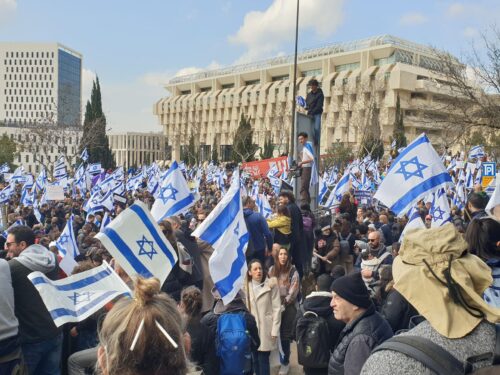
What comes to mind when you hear the words “lone farm” or “a farm in Judea and Samaria”? It may elicit an image of a subversive complex with a not-so-normative family. But that’s not the case.
Contrary to popular belief, not only are the farms not subversive, but they are part of a vital security, social, and educational enterprise of the State of Israel, as part of a proper strategy. This project thwarts the Palestinian Authority’s scheme to unilaterally establish a state in Area C, all while educating young people to be Zionists, work the land, and love their country. To get to know the project better, let’s go back to its origins.
The farms paved the way for the establishment of the state.
As early as 1908, the Palestine Office (the executive arm of the Zionist Organization in Israel), headed by Arthur Ruppin, decided to establish agricultural farms throughout the country that would train laborers to settle the land. Among other places, farms were established in Sejera, Um Juni, Hulda, Kfar Uriya, Be’er Tuvia, Beit Arif (Ben Shemen), and Hittin, and agronomists and agricultural experts helped them to grow and develop.
The role that the farms played in realizing the Zionist vision and establishing the state far exceeded their official mission. The Hebrew Defense Force (in its first incarnation, as the “Bar Giora” defense organization), the first agricultural collective in the country, and the Labor Legion were established on the Sejera farm, whose most famous laborer was David Ben-Gurion. The first kibbutzim and moshavim grew from the Kinneret Farm, and the foundations for the future state were laid in the form of institutions such as the Haganah organization, Solel Boneh, Tnuva, and the Mashbir.

From the photographs of Yehudit Garinkol
https://upload.wikimedia.org/wikipedia/commons/8/80/PikiWiki_Israel_20422_Kinneret.JPG
Agricultural farms: An appropriate Zionist response to the Fayyad Plan
After the establishment of the state, many additional farms were established on vast, uncultivated territories suitable for Jewish settlement. After the Six-Day War, cattle farms were also established in the Golan. In the Negev, over ten lone farms (a farm established and run by a single person, family, or small group) have also been established since the 1990s. However, the most important development in recent decades with regard to the agricultural farms and their contribution to Zionism was in Judea and Samaria.
In 2009, Palestinian Authority Prime Minister Salam Fayyad published a plan to take over Israeli-controlled Area C and unilaterally establish a de facto Palestinian state by 2011. This plan, known as the Fayyad Plan, posed a significant threat to the Jewish communities across Judea and Samaria and to their security and strategic interests. The appropriate Zionist response to this was the agricultural farm movement.
Maximum territory using minimum resources
What makes farms a particularly effective way to occupy land?
The farms are small and therefore require little investment from the state in terms of resources and infrastructure.
Despite the small area of the actual farm, it grants control over much larger areas, since not only do farmers work the land adjacent to the farm, but the farm’s activities also involve the daily use of extensive grazing areas. In this way, the farm’s ongoing activities thwart attempts by hostile elements to take over the land, and assist in countering agricultural crime and smuggling. The constant presence on site strengthens the rule of law and the state’s sovereignty in the frontier areas, since it facilitates alerting of any illegal construction or suspicious changes in the area. Furthermore, the constant presence of the farmers in the fields and pastures prevents the creation of no man’s land, which may become security-related points of friction.
Another advantage lies in the fact that the farm requires almost no built-up area, and therefore it blends in well, and does not jeopardize military firing ranges or green spaces whose continuity is important from an ecological perspective.
By comparison, establishing a town or city requires a complex planning, legal, and administrative process, which can take years, to approve the plan and precise location in accordance with the Planning and Building Law and the National Outline Plan. This is followed by a construction process and the creation of water, electricity, and drainage infrastructures, as well as other municipal services. This means that a large investment over many years is required by the state for residents to be able to inhabit a relatively small area.
On farms, however, a minimal investment in resources and infrastructure is enough for a small number of conscientious and determined farmers to be able to hold extremely large areas for the state, work the land or graze herds on it, and protect the borders.
In this respect, the farms proved to be an ideal, effective, and economical way for the state to spread over vast areas and create territorial continuity that is strategically vital to its ability to maintain the security of its citizens within defensible borders – all with minimal investment on its part.
A strategic and security Israeli enterprise
The achievements speak for themselves.
There are currently over a hundred agricultural farms, which are protecting over six hundred thousand dunams of state land in Judea and Samaria. The farm enterprise spans vast areas and holds more than twice as much land as all the towns and cities in Judea and Samaria combined, including Ariel, Ma’ale Adumim, Beitar Illit, and Modi’in Illit. The construction boom is continuing, and already since the Swords of Iron War broke out, at least 15 new farms have been established in the area.
A decade and a half after their establishment gained momentum, it can already be stated that the agricultural farms play a crucial role in protecting Israel from the threat posed by the Fayyad Plan, in maintaining security in the region, and in creating a defensible Israeli demographic continuity in Area C.
In November 2021, the government determined that any of its ministries, not just the Ministry of Agriculture, can support voluntary agricultural activity in areas of national priority. In December 2024, we learned that Agriculture Minister Avi Dichter had instructed his ministry to begin granting farms the pasture grants that farmers in every other region of the country have been receiving for years. Dichter defined the move as “tremendous news for farms in Judea and Samaria,” and said that “after decades of being discriminated against, farmers in Judea and Samaria have begun to receive the pasture grants they deserve”.

Unity is Strength
The large number of farms in Judea and Samaria, and the fact that they span vast areas, posed security, economic, logistic, and bureaucratic challenges to their owners that needed to be handled in an organized and coordinated manner. In 2024, farm owners in Judea and Samaria established the Farm Association, whose role is to represent them vis-a-vis the authorities, assist in the requisite coordination vis-a-vis the defense establishment and government agencies, and assist in raising resources and obtaining grants that will support the farms financially.
The establishment of the Farm Association constitutes an important development of the agricultural farm enterprise. The association enables the numerous farms in Judea and Samaria to operate in a more efficient and organized manner, and significantly strengthens the entire movement. The Farm Association currently works to support the farmers and expand the farm enterprise in Judea and Samaria, out of a commitment to the vision behind it – preserving the nation’s lands and ensuring continuous Israeli control over the region.
The association intends, among other things, to provide financial incentives to farms that generate additional sources of income, such as tourism and vineyards, which will boost their stability and economic success, as well as to set up new farms, which requires the construction of infrastructures, security, and a preliminary herd that involve high initial costs. Concurrently, the association plans to operate an educational program for youth and volunteers at the farms, which will include practical training in carpentry, welding, and riding. The plow line is the border line for Israel’s other borders as well
The struggle to thwart the Fayyad Plan to take over Judea and Samaria is still in full swing. Only the establishment of dozens of additional farms will ensure that the Palestinian Authority does not take over Area C and fatally harm Jewish settlement in areas that are essential to maintaining national security and that constitute the cradle of our identity.
However, the momentum of fulfilling the settlement vision through agricultural farms must not stop in Judea and Samaria. In recent years, the number of Jews in the Galilee has been in continuous decline, and as of 2023, it was less than 15% of all residents (compared to about 25% in the past). Meanwhile, in the Negev, the illegal expansion of the unrecognized Bedouin villages and the increased rise of Palestinian nationalism and even involvement in terrorism within it are turning it into a “state within a state” that threatens the southern towns.
In our time, the long-standing Zionist settlement system of agricultural farms, which enables a small population to own large territory in a manner that requires relatively few infrastructures and resources, has become not only more relevant than ever but also a prerequisite for Israel’s future as a Jewish and democratic state.
As the HaShomer HaChadash (The New Watchman) organization rightly claims, the agricultural farm is the settlement model of the 21st century. Only extensive investment by the State of Israel in establishing dozens of farms in the coming years, not only in Judea and Samaria but also in the Negev and Galilee, as a project of national priority, will allow us to protect all parts of the Land of Israel, and not lose the south and the north again.
More than a century ago, Joseph Trumpeldor said: “Wherever the Jewish plow plows its last furrow, that is where the border will run”. This insight is more relevant than ever. This makes the agricultural farm enterprise the most important security and strategic mission of our time.






